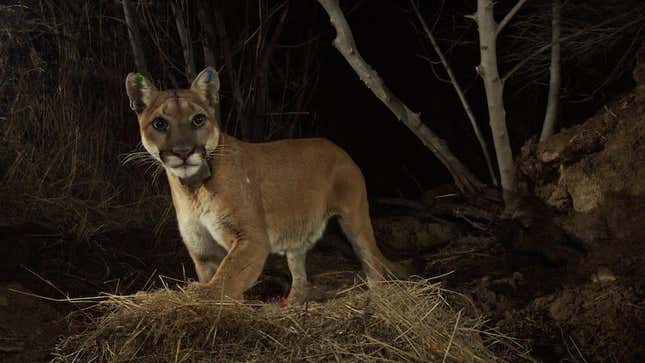
Researchers have spotted physical abnormalities associated with a lack of genetic diversity in cougars living in the Santa Monica Mountains of southern California, including kinked tails and, in one male, only one descended testicle.
Cougars living northwest of Los Angeles in the Santa Monica Mountain region are in big trouble, according to a press release issued by the National Park Service. Biologists with the Santa Monica Mountains National Recreational Area have, for the very first time, documented deformities in these animals linked to inbreeding, namely kinked tails shaped like the letter “L” and cryptorchidism, in which one or both testes fail to drop from the abdomen into the scrotum.
“This is something we hoped to never see,” said Jeff Sikich, a wildlife biologist with the SMMNRA, in the press release. “We knew that genetic diversity was low here, but this is the first time we have actually seen physical evidence of it. This grave discovery underscores the need for measures to better support this population.”

Sikich, with the help from three interns and a post-doctoral researcher from UCLA, examined a sedated male cougar, designated P-81, in early March. The cougar, still less than 2 years old and weighing 95 pounds, exhibited a kinked tail and cryptorchidism. The scientists also took tissue and blood samples and placed a GPS radio collar around his neck.
A few days later, another male with a kinked tail was spotted by a remote camera in the same area between the 405 and Hollywood Freeways. The researchers suspect the two cougars are closely related, possibly even siblings. A third cougar with a crooked tail was also spotted by the camera.
Fewer than two dozen mountain lions live in the canyonlands northwest of Los Angeles, according to the Los Angeles Times. That these animals are exhibiting signs of poor genetic diversity is hardly a surprise, but that doesn’t make it less upsetting. Research from 2019 predicted the probability of local extinction at between 16% and 21% over the next 50 years as a result of this genetic bottleneck and “inbreeding depression.” A similar study done back in 2016 assessed the probability at virtually 100% under certain conditions. Both studies were co-authored by Sikich.

“These lions’ kinked tails are a genetic cry for help, telling us we must make it easier for them to move around and find mates,” declared Tiffany Yap, a biologist at the Center for Biological Diversity, in the press release. “More wildlife crossings are part of it, but we need to stop sprawl developments that cut these beautiful cats off from each other.”
Indeed, these big cats are hemmed in by dangerous highways, making it difficult for them to move about and replenish their gene pool. A potential solution is in the works, however, in the form of a wildlife overpass above the 101 Freeway in Agoura Hills. This overpass, at an estimated cost of $60 million, is currently being funded by private and corporate donors, including contributions from Boeing and the Leonardo DiCaprio Foundation, reports the LA Times. Construction could begin in late 2021 if funding stays on course. An overpass at this spot is ideal, as natural habitats are found on both sides of the freeway; the National Park Service says the bridge would link populations south of the 101 Freeway to natural areas north of the Simi Hills, the Santa Susana Mountains, and, importantly, the Los Padres National Forest.
Recently, panthers living in Florida experienced a similar problem with inbreeding (including the kinked tails and cryptorchidism), which conservationists remedied by importing eight female mountain lions from Texas. The project worked, raising the population to an estimated 200 individuals, up from around two dozen. Conservationists in southern California don’t intend to import any new animals, as they hope the future overpass will connect the struggling cougar group with the much larger population of mountain lions living in the Los Padres National Forest.
As it stands, mountain lions are not listed as an endangered species in California. This is under review, however, with the California Fish and Game Commission expected to make a decision on the matter next summer, at which time the animals could be protected under the state’s Endangered Species Act, reports the LA Times. Such a move would place limits on highway construction and real estate development.